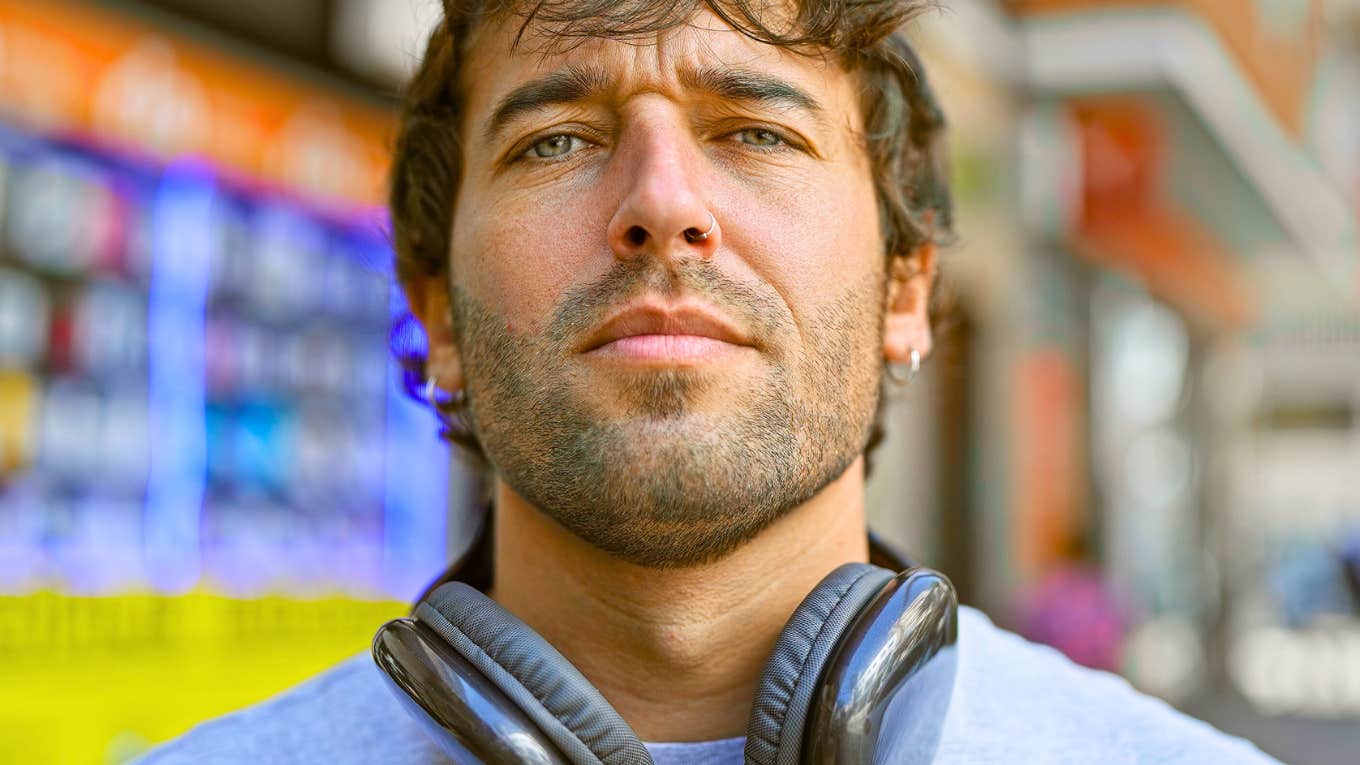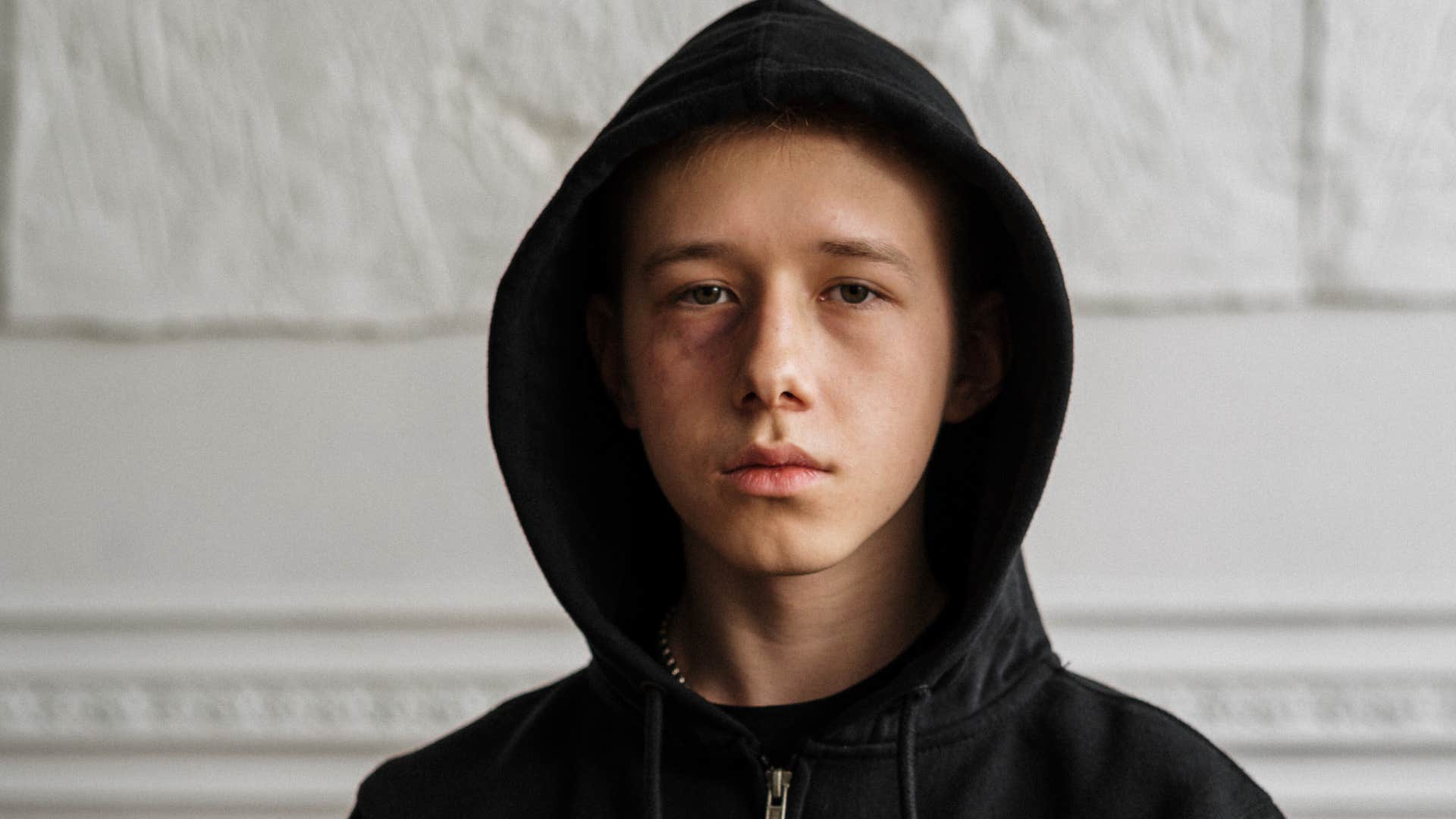Men Who Can't Acknowledge Their True Feelings Usually Have These 11 Reasons
Don't be fooled by the silence. There are plenty of unexpressed emotions just beneath the surface.
 Krakenimages.com | Shutterstock
Krakenimages.com | Shutterstock Many men have grown up in environments that trained them to suppress their emotions instead of exploring them in a healthy way. While some can unlearn these harmful lessons if they choose to, others stay trapped in a state of emotional silence. If a man struggles to acknowledge his real feelings, there might be certain reasons why.
Whether in love or during times of conflict and vulnerability, a man's inability to share his truest feelings isn't always about pride or defiance. It could be a mixture of fear, conditioning, and a need to self-protect. Understanding the reasons some men cannot acknowledge their feelings can help to support them, provide a safe space to open up, and let them know it is okay to feel.
Men who can't acknowledge their true feelings usually have these 11 reasons
1. They were taught that emotions equal weakness
 Africa images via Canva
Africa images via Canva
From a very early age, many young men are told to "stop crying" or "man up". One man in particular that I know would often tell his sons they were acting like Girl Scouts if they expressed strong emotions. Make no mistake about it. This is toxic masculinity. Without intervention, this mindset passes from generation to generation unchecked, creating many of the issues we see in men today.
Boys who were ridiculed or shamed for being vulnerable or sensitive internalize the belief that men are exempt from expressing emotions. To compound it, not only are they not supposed to bare their souls, they don't know how to. They have never been shown an example of a man who can clearly share how he feels in a healthy way.
2. They don't have the right language for it
 Timur Weber from Pexels via Canva
Timur Weber from Pexels via Canva
If you grew up in a household like mine, emotions were rarely, if ever, discussed. Sure, people might have angry outbursts, but that was normal. My parents didn't have parents who allowed them the space and grace to share their deepest emotions, so they didn't know how to do it. I even continued the pattern with my eldest children, but learned better by the time my younger sons came along.
Like anything else we teach our children, emotions are learned. If a man did not have discussions about his feelings at home when he was growing up, he's likely to have trouble expressing them throughout the rest of his life. He doesn't have the vocabulary that comes along with emotional intelligence, so he can't describe what he is feeling. It's not that he won't share his emotions. He doesn't know how to.
3. They fear being judged or rejected
 KatarzynaBialasiewicz from Getty Images via Canva
KatarzynaBialasiewicz from Getty Images via Canva
Opening up emotionally requires trust. You have to feel as if the person you are opening up to will understand your feelings and truly hear you. Men who struggle to share their state of mind and reveal the parts of themselves that are not perfect are afraid that they might be rejected or judged. So, they keep their innermost thoughts securely tucked away to their own detriment.
For many men, the fear that someone will criticize them, think less of them, or even leave them for being honest, is the catalyst for keeping their mouths shut. Those bottled-up emotions spill out into other areas of life, making them more aggressive and contributing to any mental health issues.
4. They think they are being strong
 Maridav via Canva
Maridav via Canva
A common misconception is that men who can keep their emotions buried are the epitome of strength. The truth is that it takes superhuman strength to get comfortable with being your authentic self and sharing your feelings without shame or guilt. The man who is emotionally intelligent has a clear advantage over the one who is emotionally avoidant.
The idea that the more control a man has over himself, his circumstances, and his emotions, makes him more competent, is something that the mental health profession has been trying to reverse in recent years. Acknowledging messy or painful feelings is not giving up control. It's addressing underlying issues and, in the long run, will give him total control.
5. They've been hurt before
 Jupiterimages from Photo Images via Canva
Jupiterimages from Photo Images via Canva
As children, many men have been teased or reprimanded when they tried their best to express how they were feeling. That traumatic experience made them go inside their mental shell, never to come out again. Because the adults they trusted most as children never truly listened to them, they have decided it is pointless to try to move on stoically.
Being ignored, mocked, or betrayed by someone you entrusted with your hidden mental state can easily make you decide to keep it safely locked away in the future. One painful experience can shut down emotional expression for years. Men who have experienced this need to do the work to change the way they see things.
6. They don't know what to expect
 Satrio Ramadhan from diversifylens via Canva
Satrio Ramadhan from diversifylens via Canva
Admitting that you are sad, in love, confused, or mourning can lead to change or confrontation. Feelings are complicated, and that uncertainty leads many men to avoid them altogether. They don't know what will happen after they tell someone how they feel. So, they opt to keep quiet and avoid the risk.
The fear of consequences causes some men to ignore what's brewing deep inside them. Unbeknownst to them, the risk of not expressing themselves is so much greater than it is to be transparent. Avoiding their feelings can lead to negative consequences like depression, anxiety, relationship issues, and physical health problems. It might even exacerbate those existing feelings.
7. They mistake anger for healthy emotions
 Prostock-studio via Canva
Prostock-studio via Canva
The lack of knowledge about how to process fear, sadness, disappointment, and other normal emotions results in lumping them all into one acceptable emotion: anger. Men who have never been taught to express themselves use their ability to get angry as a default setting. Any time an uncomfortable emotion pops up, they mask it with anger.
Often, a man is not truly upset, but is running away from feelings that he has decided are not "manly." So, he opts to fall back on the familiar because he knows exactly how to manage that. If he can learn to identify each individual emotion and deal with them separately and effectively, he can reach peak emotional awareness.
8. No one modeled healthy emotional expression for them
 cottonbro studio from Pexels via Canva
cottonbro studio from Pexels via Canva
I only saw my dad cry twice in my life. He cried when my brother passed away, but mostly in private. Then he cried when he woke up from a coma, expecting to see my brother. My father was a prime example of a man who had been taught that his value was in how well he could hide his feelings. In the end, his inability to put himself and his overall wellness first cost him his life.
My dad's story is not unique. Many men are just carrying on the toxic tradition of keeping a strong demeanor no matter what life throws at them. They become human powder kegs just waiting to erupt one day. But we have the ability to break generational curses. The fact that no one showed you how to be emotionally expressive doesn't stop you from teaching your sons or the men in your life differently.
9. They don't want to be a burden
 TrudyWilkerson from Getty Images via Canva
TrudyWilkerson from Getty Images via Canva
Some men grew up believing that their job is to carry the weight of the world on their shoulders. Emotions are for women and children, from their perspective. They think that they must deal with their problems on their own and protect the people they care about from the burden of hearing them. So, they go unaddressed and unhealed.
Rather than take the chance that they are dragging someone down, a man who has no authentic self-expression will keep his woes to himself. He puts on a brave face for the world while falling apart internally. Instead of reaching out to those who will undoubtedly love and support them unconditionally, they choose to hide the most challenging parts of themselves.
10. They don't trust that their emotions will be kept private
 Prostock-Studio from Getty Images via Canva
Prostock-Studio from Getty Images via Canva
For many people, the fear that anything they share with you will be shared with others stops them from opening up. They would hate to pour their heart out to a person they trust, only to have those things shared with people who don't care or have their best interests at heart. So, since they don't know whom to trust, they shut down.
That fear that they won't be able to control who hears about their personal business stops emotional openness dead in its tracks. For some men, acknowledging the grief, heartache, or trauma they carry feels way too emotionally risky, so they choose not to.
11. They associate their worth with what they do, not how they feel
 D-Keine from Getty Images Signature via Canva
D-Keine from Getty Images Signature via Canva
Masculinity is based on characteristics such as strength, courage, leadership, and independence. When it is twisted, it results in over-competitiveness and unnecessary aggression. Men start to believe that what they do is much more important than how they feel. So, they manage their emotions by achieving more.
Their identity is tied to productivity, success, or being a good provider, and emotions can definitely get in the way of those things. They get sidelined or ignored because they don't fit into his idea of what a man should be. But all people are a combination of masculinity and femininity. Both have their uses. Balance is the key to men being able to express themselves in a healthy, healing way.
NyRee Ausler is a writer from Seattle, Washington, and the author of seven books. She focuses on lifestyle and human interest stories that deliver informative and actionable guidance on interpersonal relationships, enlightenment, and self-discovery.

